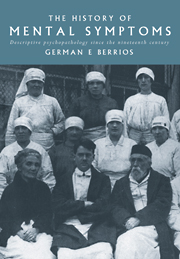Book contents
- Frontmatter
- Contents
- PREFACE
- ACKNOWLEDGEMENTS
- INTRODUCTION
- PART I The object of inquiry
- PART II Cognition and consciousness
- PART III Mood and emotions
- PART IV Volition and action
- CHAPTER 14 The will and its disorders
- CHAPTER 15 Feelings of fatigue
- CHAPTER 16 Catalepsy, catatonia and stupor
- CHAPTER 17 Tremor, rigidity, akathisia, and stereotypy
- PART V Miscellany
- REFERENCES
- NAME INDEX
- SUBJECT INDEX
CHAPTER 14 - The will and its disorders
from PART IV - Volition and action
Published online by Cambridge University Press: 08 January 2010
- Frontmatter
- Contents
- PREFACE
- ACKNOWLEDGEMENTS
- INTRODUCTION
- PART I The object of inquiry
- PART II Cognition and consciousness
- PART III Mood and emotions
- PART IV Volition and action
- CHAPTER 14 The will and its disorders
- CHAPTER 15 Feelings of fatigue
- CHAPTER 16 Catalepsy, catatonia and stupor
- CHAPTER 17 Tremor, rigidity, akathisia, and stereotypy
- PART V Miscellany
- REFERENCES
- NAME INDEX
- SUBJECT INDEX
Summary
The ‘will’ no longer plays a role in psychiatry and psychology. A hundred years ago, however, it was an important descriptive and explanatory concept, naming the human ‘power, potency or faculty’ to initiate action. At the end of the nineteenth century, it came under attack: ‘the domain of the voluntary, reified under the name of will in popular language was adopted by the primitive psychology of faculties’, (my italics) Experimentalism, psychoanalysis and behaviourism accelerated its fall, and by the end of the First World War, the will was no longer a fashionable concept. This created a conceptual vacuum in the ‘domain of the voluntary’ which has since been unsatisfactorily filled by notions such as Instinct’, ‘drive’, ‘motivation’, ‘decision-making’, and ‘frontal lobe executive’. The decline of the will also led to neglecting the study of aboulia, impulse, agoraphobia, and obsession as ‘pathological disorders of the will’. This chapter deals with the history of these disorders.
Will before the nineteenth century
The meaning of will was constructed in Classical times as a semantic blend of impulse, instinct, tendency, desire, objective and inclination. The Greeks, however, did not have a separate notion of the will and considered human action as being closely integrated with the intellect and the emotions: thus, Plato believed that desires or appetites (orexis) were related to sensations, whilst the will (boulesis) was linked to reasons and thoughts: ‘of our unnecessary pleasures and appetites there are some lawless ones, I think, which probably are to be found in us all, but which, when controlled by the laws and the better desires in alliance with reason, can in some men be altogether got rid of’.
- Type
- Chapter
- Information
- The History of Mental SymptomsDescriptive Psychopathology since the Nineteenth Century, pp. 351 - 368Publisher: Cambridge University PressPrint publication year: 1996



